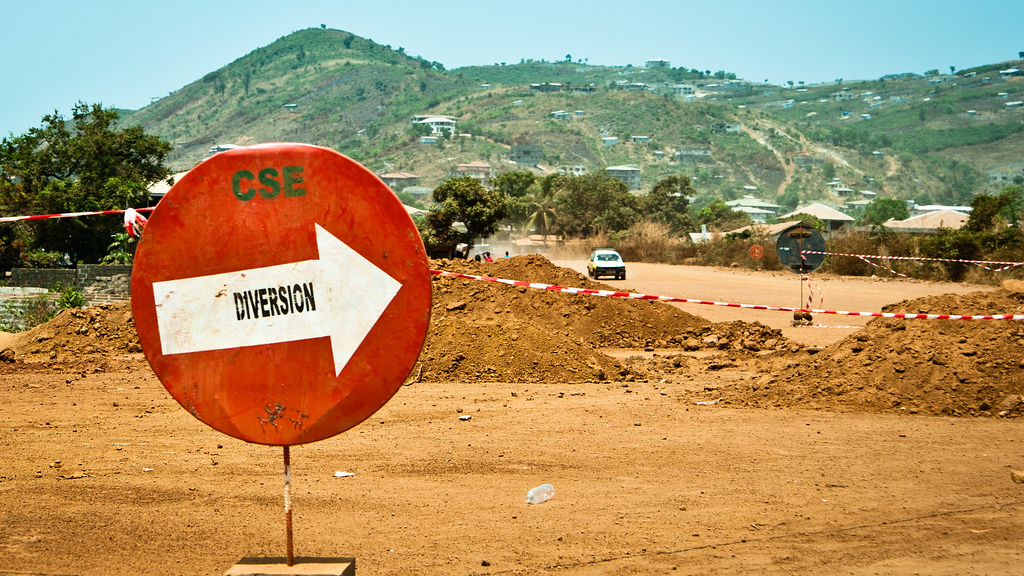Mistakes are a common and even natural part of fieldwork. When covered up in grant applications and evaluations they can have long-term affects on the lives of respondents and co-researchers, especially in the global South. Based on her experiences in Sierra Leone, Caitlin Ryan reflects on the need to ‘fail forward’, where the global North researcher learns, reflects and adjusts to do things better.
This post is part of the series Rethinking ethics and identity in fieldwork.
In a basic 7th grade textbook ‘flow chart’ for the Scientific Method, there is a step that asks whether the ‘procedure is working?’ If you follow the ‘no’ option, the flow chart re-directs you to a new step to ‘troubleshoot the procedure and re-check all steps’.
There is a tendency in academia to pitch our research process as a smooth, linear, successful path, where no mistakes are made, and where we never have to answer ‘no’ to the question of whether or not the ‘procedure is working’. Of course, we all know that this is not really the case. This tendency is particularly pronounced and problematic when we write-up our methodology sections for fieldwork.
A particular pressure exists in social science research to make it seem like we didn’t get anything wrong – for fear of having the article rejected, or for fear of tough questions from the audience or from fear of having a grant application rejected. I am also guilty here – my method sections make it seem like everything went precisely to plan, with no ethical, logistical, methodological blunders. The sections leave out doubt, stress, anxiety, missed opportunities, mechanical breakdown, and more. We gloss over our failures. I gloss over my failures.
This photo of a woman named Mafudia, who worked with me as a research broker, reminds me of what can be at stake in failure during field research. It also makes me determined to talk more openly about failure, because Mafudia died during the period of the research project.
Failure is an intrinsic part of doing research – it is, in fact, integral to the Scientific Method. More so, anyone who has done research in ‘the field’ can’t be honest with themselves without acknowledging that there are always moments of failing, decisions that have failed and/or feelings of failure. My reflexive notebooks from fieldwork reflect this. Research for my last project involved visits to communities in Sierra Leone with land under lease to agribusiness investment companies to understand what made these leases possible. In one period of trying out a method of participatory mapping in rural communities in Sierra Leone, almost every day I reflected on something that had failed during the method. It was frustrating, but this sort of thinking helped me to decide to work with the research team to find something better. In this sense, I was following the correct protocol for the Scientific Method, even if I wasn’t thinking in those terms precisely.
Some of my failures seem bigger than methodological ‘procedure’. I think that this is because fieldwork in the global South involves a constant grappling with questions of exploitation, extraction and coloniality. Even when I try to check my privilege, or when I think I have managed to design research that isn’t extractive or exploitative, I know that I sometimes fail at this.
Once, a Paramount Chief chastised me for coming to Sierra Leone to conduct research that would help my career. There was no way I could say that he was wrong; I do get to put things on my CV because of my research with rural communities. For a long time after that interview, I felt like I’d failed in the basic premise of thinking that I could go to Sierra Leone for research.
These feelings can be further complicated by requests for help – from participants and research brokers and people I see on the street when I go about my ‘normal’ day-to-day tasks. More than once, at the end of an interview in rural communities, respondents would ask for material help. Even though I had explained at the start of the interview that I was not there to provide any type of material assistance, these questions always made me feel some sort of moral failure. Even walking around the town where I stayed for the duration of the project brought up feelings of failing. For example, if a child asked me for money to eat and I said ‘no, I’m sorry’ or if the driver I hired asked for two weeks of ‘lunch money’ in advance and I said ‘no, I’m sorry’ – was I failing?
These experiences of failure are not really about the scientific method, they are more about feeling that you are failing to live up to your own moral standard, that you are failing to share the resources you have, or that you are failing to confront your own privilege.
Grappling with failure and feelings of failing in these moments is difficult because these feelings go beyond ‘simple’ questions of method – they are moments where it becomes impossible to maintain some sort of illusion of a neat division between the ‘professional’ research encounter and one’s own sense of self. In some moments, my sense of self has collided with decisions that I’ve made ‘as a researcher’ – leading to a sort of double feeling of failure. Nothing makes me think about this more than Mafudia’s death. I spent months and months racking my memory for moments where I may have (unconsciously or not) acted like adherence to the research design or the schedule had taken precedence over her health. While I’ve come to accept that the outcome of the situation was beyond my control, I also know that I undeniably made decisions that made ‘data collection’ my highest priority.
Because of these moments, I’ve started to think about what it might mean to ‘fail forward’. I don’t think it’s possible to eliminate failure – either of the procedural or more moral kind. I also think that ignoring or glossing over our failures is problematic. In procedural terms, we’re setting bad examples for students and each other in pretending like we don’t have to deal with that part of the Scientific Method. In terms of moral failure, I think the stakes are much higher. Thinking seriously about our failures in this sense should serve as reminders that when we do fieldwork, we are entering people’s lives. Actual people, living actual lives, where much may be at stake. Failing to make our promises to respondents clear, or failure to uphold them can be damaging. Failing to think about and with our research brokers about their wellbeing and safety can be dangerous. Our failures can have grave implications. In this sense, doing research that centers human dignity necessitates that when we fail, we fail forward – we take something from that failure – we grapple with it, learn from it, adjust to it and make a conscious effort to be better.
I am really heartened to see that we (global North academics doing research in the global South) are starting to do better. There are more panels at conferences, training sessions for graduate students, workshops, writing collectives, books, and blogs where we are talking about what we are doing wrong and, most usefully, where research brokers from the global South share experiences of harmful and dangerous failures of researchers from the global North. Talking about failure and failing is still hard, but I think that is okay because it means, hopefully, we are taking it seriously. I think it means that we are failing forward.
Photo: Western Area Peninsula, Sierra Leone. Credit: Eduardo Fonseca Arraes.




